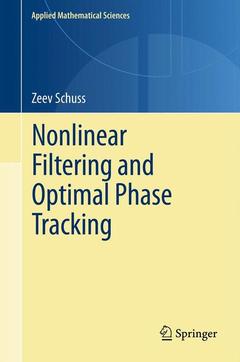Description
Nonlinear Filtering and Optimal Phase Tracking, 2012
Applied Mathematical Sciences Series, Vol. 180
Author: Schuss Zeev
Language: English
Subjects for Nonlinear Filtering and Optimal Phase Tracking:
Approximative price 52.74 €
In Print (Delivery period: 15 days).
Add to cart
Nonlinear Filtering and Optimal Phase Tracking
Publication date: 01-2014
262 p. · 15.5x23.5 cm · Paperback
Publication date: 01-2014
262 p. · 15.5x23.5 cm · Paperback
Approximative price 52.74 €
In Print (Delivery period: 15 days).
Add to cart
Nonlinear filtering and optimal phase tracking
Publication date: 11-2011
262 p. · 15.5x23.5 cm · Hardback
Publication date: 11-2011
262 p. · 15.5x23.5 cm · Hardback
Description
/li>Contents
/li>Biography
/li>Comment
/li>
This book offers an analytical rather than measure-theoretical approach to the derivation of the partial differential equations of nonlinear filtering theory. The basis for this approach is the discrete numerical scheme used in Monte-Carlo simulations of stochastic differential equations and Wiener's associated path integral representation of the transition probability density. Furthermore, it presents analytical methods for constructing asymptotic approximations to their solution and for synthesizing asymptotically optimal filters. It also offers a new approach to the phase tracking problem, based on optimizing the mean time to loss of lock. The book is based on lecture notes from a one-semester special topics course on stochastic processes and their applications that the author taught many times to graduate students of mathematics, applied mathematics, physics, chemistry, computer science, electrical engineering, and other disciplines. The book contains exercises and worked-out examples aimed at illustrating the methods of mathematical modeling and performance analysis of phase trackers.
Diffusion and Stochastic Differential Equations.- Euler's Simulation Scheme and Wiener's Measure.- Nonlinear Filtering and Smoothing of Diffusions.- Small Noise Analysis of Zakai's Equation.- Loss of Lock in Phase Trackers.- Loss of Lock in RADAR and Synchronization.- Phase Tracking with Optimal Lock Time.- Bibliography.- Index
Zeev Schuss is a Professor in the School of Mathematical Sciences at Tel Aviv University.
Many exercises and examples included
Balance between mathematical rigor and physical intuition
An analytical rather than measure-theoretical approach to the derivation and solution of the partial differential equations of nonlinear filltering theory
© 2024 LAVOISIER S.A.S.




